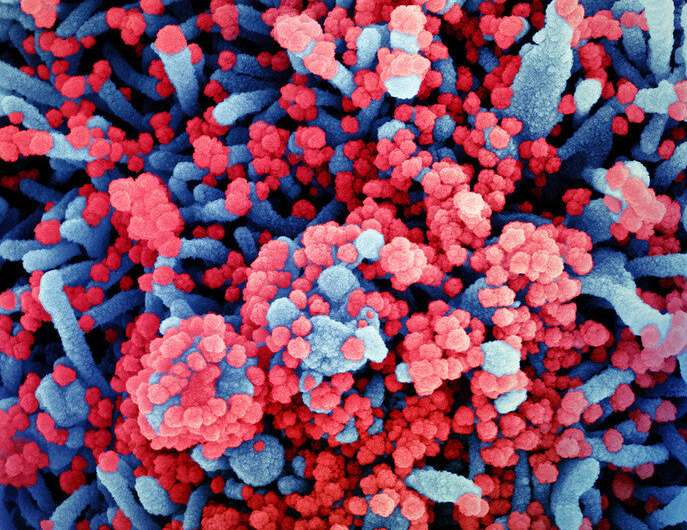June 17, 2021 report
Coronaviruses can induce host cell apoptosis

A large team of researchers working at the University of Hong Kong has found that three major types of coronaviruses are able to induce cell apoptosis in infected hosts. In their paper published in the journal Science Advances, the group describes their study of how SARS-Cov-2, SARS-Cov-1 and Mers-Cov damage lung tissue and what they found.
Medical researchers have known for some time that coronaviruses can wreak havoc on host tissue, most particularly in the lungs—as they do so, large numbers of host cells are killed. But until now, it has not been clear how it happens.
Prior research has shown that as cells grow older, they eventually need to be replaced. For that to happen, the cells set off a process called apoptosis, where they die in a way that makes it easy for the body to wash them away. In this new effort, the researchers exposed human lung tissue to Mers-Cov in a petri dish and watched very closely to see what would happen. They found that exposure to the coronavirus pushed the lung tissue to induce cell apoptosis.
The researchers next analyzed the mRNA of the lung cells after they had been infected by MERS-CoV in an attempt to better understand what the coronavirus was doing to them to induce apoptosis. They found that the genes that regulated the expression of a protein known as PERK were changed by the coronavirus to force more production of PERK—prior research has shown that PERK is involved in setting off apoptosis. The researchers then chemically prevented PERK signaling from occurring in a sample of lung tissue that had been infected by MERS-CoV—doing so reduced both the spread of the coronavirus and viral induced apoptosis. The team repeated their experiments in live transgenic mice and found the same results. When they repeated the experiments with SARS-Cov-2 and SARS-Cov-1, however, they did not find the same results—there was no reductions in cell apoptosis. But they did find that a different inhibitor did result in reductions in viral induced apoptosis. The researchers suggest their findings indicate that the means by which coronaviruses damage lung tissue is by inducing cell apoptosis and that therapies developed to prevent cell apoptosis may be effective in preventing cell host damage in such infections.
More information: Hin Chu et al, Targeting highly pathogenic coronavirus-induced apoptosis reduces viral pathogenesis and disease severity, Science Advances (2021). DOI: 10.1126/sciadv.abf8577
Journal information: Science Advances
© 2021 Science X Network





















